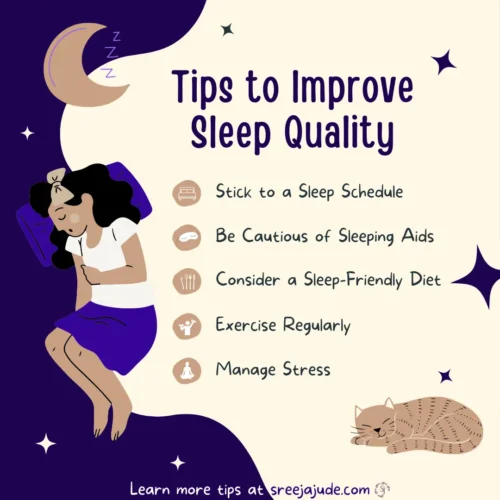
Sleep is one of the most important pillars of health, yet it’s often neglected in today’s fast-paced world. If you’re wondering how to improve sleep quality naturally, small lifestyle changes can make a big difference.
Poor sleep affects mood, memory, immunity, and overall well-being.
In this guide, you’ll learn:
✔️ 10 practical tips to improve sleep quality
✔️ The science behind better sleep
✔️ Lifestyle habits that support deep rest
The Science Behind Sleep Quality Naturally
One needs to understand the basic science behind sleep to grasp the importance of sleep quality. Sleep comprises several stages, each characterized by unique brain waves and physiological functions. From light sleep to deep sleep and REM (Rapid Eye Movement) sleep, each stage plays a crucial role in restoring our body and mind. Understanding sleep stages helps improve sleep quality naturally.
Disrupting this natural sleep cycle can lead to many health issues, including impaired memory, weakened immunity, and mood disorders, emphasizing the importance of good quality sleep.
10 Tips to Improve Sleep Quality Naturally

Tip 1: Stick to a Sleep Schedule for Better Sleep Naturally
Consistency is key when it comes to optimizing sleep quality. Our bodies follow a natural sleep-wake cycle, known as the circadian rhythm, regulated by light and darkness. Adhering to a consistent sleep schedule by going to bed and waking up at the same time each day helps maintain this internal body clock. This habit not only improves sleep quality but also enhances alertness and daytime functioning. Remember, a disciplined sleep schedule is just as important on weekends as on weekdays to prevent a disruptive sleep pattern known as ‘social jet lag.’
Tip 2: Be Cautious of Sleeping Aids
Sleeping aids should be used cautiously, including prescription drugs, over-the-counter medications, and natural supplements. While they may provide short-term benefits, they often have side effects and can lead to dependency. If you’re considering such aids, it’s important to consult with a healthcare provider first. As part of this discussion, inquire about the pros and cons of sleep apnea mouth guards. These devices can be beneficial in certain cases, reducing sleep apnea symptoms and improving sleep quality. However, they also have cons, such as discomfort or drooling, and may not be suitable for everyone.
Tip 3: Consider a Sleep-Friendly Diet
What you consume can notably influence your sleep pattern. Certain foods and beverages can either aid or impede your sleep. Aim for a diet that is well-balanced and includes lots of fresh produce, healthy grains, lean meats, and fruits. Avoid large meals close to bedtime as they can cause discomfort and may keep you awake. Caffeinated drinks such as coffee, tea, and energy drinks are known stimulants that can disrupt sleep if consumed later in the day. Similarly, while alcohol helps you sleep, it interferes with the sleep cycle, preventing you from achieving deep sleep.
Tip 4: Exercise Regularly
Exercise is a powerful sleep aid. Regular physical activity, especially aerobic exercises like walking, running, or swimming, can help you fall asleep faster and enjoy deeper sleep. However, timing is crucial. While some people might experience no sleep disturbance with evening workouts, others might find it more challenging to fall asleep after an adrenaline-boosting workout. Thus, it’s best to listen to your body and plan your workouts accordingly. Remember that light exercises such as stretching or yoga can significantly improve sleep quality.
Read More: 5 Simple Ways To Improve Your Physical Health
Tip 5: Manage Stress to Improve Sleep Quality Naturally
Stress and anxiety are common culprits that affect sleep quality. Chronic stress can lead to insomnia, night sweats, and frequent wakefulness. Incorporating relaxation techniques into your daily routine can effectively manage stress levels, paving the way for better sleep. Yoga, mindfulness meditation, deep breathing, and progressive muscle relaxation are some techniques you might consider. Additionally, maintaining a positive mindset, setting priorities, and organizing your tasks can help manage stress, eventually enhancing your sleep.
Tip 6: Limit Daytime Naps
While a short power nap in the afternoon can help improve mood, performance, and alertness, long or frequent naps can sabotage sleep. Long daytime naps can interfere with your nighttime sleep, particularly if you struggle with insomnia or poor sleep quality. If you choose to nap, limit yourself to about 20 to 30 minutes and make it during the midafternoon. If you work nights, however, you’ll need to make an exception to the rules about daytime sleeping.
Tip 7: Create a Restful Environment for Better Sleep Quality Naturally
The environment in which you sleep significantly impacts the quality of your sleep. A serene, dark, and quiet space is conducive to better sleep. Use earplugs, eye shades, or white noise machines to minimize disturbances. Pay attention to your bedding, too – a comfortable mattress and pillows can make a difference. Moreover, ensure the room temperature is kept cool, as a cooler environment promotes better sleep. An ideal sleep environment serves as a sanctuary, inviting relaxation and restfulness.
Tip 8: Limit Electronic Use Before Bed
Using electronic devices such as smartphones, tablets, and laptops close to bedtime can interfere with sleep. The light emitted from these devices can suppress melatonin production, a hormone that regulates your sleep-wake cycle. Furthermore, the engaging nature of these devices can delay your bedtime. Aim to establish a tech-free ritual before bedtime, such as reading a book, listening to calming music, or practicing relaxation techniques.
Tip 9: Understand Your Sleep Needs
Sleep needs vary from person to person and change throughout your life. Factors like age, lifestyle, and overall health significantly influence the amount of sleep you need. While seven to nine hours of sleep per night is a general recommendation for most adults, some people might need more, and others less. Understanding your sleep needs can go a long way toward improving your sleep quality and overall health.
Tip 10: Consult a Professional for Sleep Issues
If you’ve tried various strategies and still struggle with sleep, it might be time to consult a professional. Chronic sleep deprivation and ongoing insomnia can lead to serious health complications. Sleep disorders like sleep apnea or restless legs syndrome also require professional treatment.
Read More: Understanding the Effects and Diagnosis of Color Blindness
How to Improve Sleep Quality Naturally
To improve sleep quality:
-
Follow a consistent sleep schedule
-
Avoid caffeine before bedtime
-
Reduce screen exposure
-
Create a calm sleep environment
Most people see noticeable improvement within a few weeks.
Final Thoughts
If you’re looking for ways to improve sleep quality naturally, these simple lifestyle changes can make a lasting impact. These habits can help improve sleep quality naturally without relying on medication.
Better sleep leads to improved mood, stronger immunity, and better daily performance.
Prioritizing sleep today helps protect your long-term health.
Frequently Asked Questions
Q: How can I improve sleep quality fast?
A: Maintain a sleep schedule, reduce screen time, and create a calm sleep environment.
Q: What causes poor sleep quality?
A: Stress, caffeine, irregular sleep habits, and excessive screen use.
Q: Does exercise improve sleep?
A: Yes, regular exercise helps you fall asleep faster and sleep deeper.

